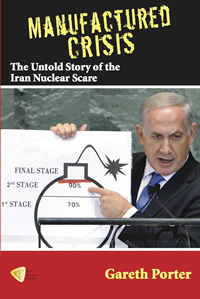David Swanson's Blog, page 120
February 24, 2014
Talk Nation Radio: Jennifer Gibson: Drones Terrorize Populations, Victims Seek Justice at ICC
 https://soundcloud.com/davidcnswanson/talk-nation-radio-jennifer
https://soundcloud.com/davidcnswanson/talk-nation-radio-jennifer
Jennifer Gibson, a U.S. lawyer, leads Reprieve’s drones work in Pakistan. Prior to joining Reprieve, Jennifer was at Stanford University, where she co-authored, Living Under Drones -- one of the most comprehensive accounts of the impact of drones in Pakistan to date. She has brought drone victims to testify in Congress and to meet with members of various European parliaments, and recently to the International Criminal Court to file a complaint against the U.K., Germany, and Australia for their complicity in U.S drone murders. Learn more: http://Reprieve.org.uk
Total run time: 29:00
Host: David Swanson.
Producer: David Swanson.
Music by Duke Ellington.
Download from Archive or LetsTryDemocracy.
Pacifica stations can also download from AudioPort.
Syndicated by Pacifica Network.
Please encourage your local radio stations to carry this program every week!
Please embed the SoundCloud audio on your own website!
Past Talk Nation Radio shows are all available free and complete at
http://davidswanson.org/talknationradio
If the Defense Department's Not Defensive, What Would Be?
 Militarism has made us , and continues to do so. It is not a useful tool for protection. So, what is?
Militarism has made us , and continues to do so. It is not a useful tool for protection. So, what is?
Studies over the past century that nonviolent tools are more effective in resisting tyranny and oppression and resolving conflicts and achieving security than violence is.
Wealthy militarist nations like the United States think of their militaries as global police, protecting the world. The world disagrees. By a large margin people all over the world consider the United States the .
The United States could easily make itself the most beloved nation on earth with much less expense and effort, by ceasing its "military aid" and providing a bit of non-military aid .
The momentum of the military-industrial complex works through the hammer-nail effect (if all you have is a hammer, every problem looks like a nail). What’s needed is a combination of disarmament and investment in alternatives -- alternatives like diplomacy, arbitration, international law enforcement, cultural exchange, and cooperation with other countries and people.
The most heavily armed nations can help disarmament in three ways. First, disarm — partially or fully. Second, stop selling weapons to so many other countries that don’t manufacture them themselves. During the Iran-Iraq war in the 1980s, at least 50 corporations supplied weapons, at least 20 of them to both sides. Third, negotiate disarmament agreements with other countries and arrange for inspections that will verify disarmament by all parties.
The first step in handling crises is to stop creating them in the first place. Threats and sanctions and false accusations over a period of years can build momentum for war that is triggered by a relatively small act, even an accident. By taking steps to avoid provoking crises, much effort can be saved.
When conflicts inevitably do arise, they can be better addressed if investments have been made in diplomacy and arbitration.
A fair and democratic international system of law is needed. The United Nations needs to be reformed or replaced with an international body that forbids war and allows equal representation to every nation. The same goes for the International Criminal Court. The idea behind it is exactly right. But if it only prosecutes tactics, not the launching, of wars. And if it only prosecutes Africans, and only Africans not cooperating with the United States, then it weakens the rule of law rather than expanding it.
Pakistani victims and family members who have charged the CIA with murder in their courts, and whose courts have declared U.S. drone strikes in Pakistan illegal, are charging the U.K., Germany, and Australia through the ICC with the crime of assisting in U.S. drone murders. But if the U.S. cannot be charged because it's not an ICC member, and if U.S. allies will end up walking free because the U.S. has a U.N. veto, justice is not being done -- the alternative of the rule of law to the rule of force is not really being tried. Reform or replacement of our international bodies, not abandonment, is needed.
Here's a list of approaches that could move us in the right direction, from a movement working to advance them.
And here are a few specific projects:
Set up conversion commissions.
Get free money for transition.
Participate in the Global Day of Action on Military Spending.
Spring Days of Drone Action.
Support peace in Syria.
I recently had the opportunity to speak about this movement at an event in Portland, Maine, where people turned out in the middle of a snow storm to discuss ending all war forever:
http://www.youtube.com/watch?v=AevhD6JFDB0
You might find the next video more interesting, as it includes both me and Shenna Bellows answering questions about militarism and peace making. Bellows is the Democratic candidate for U.S. Senate challenging Republican incumbent Susan Collins:
http://www.youtube.com/watch?v=vfhMOGk-KMY#t=1072
February 22, 2014
Video: David Swanson and Maine Candidate for U.S. Senate Shenna Bellows on War and Peace
February 20, 2014
Operation Nazification
Annie Jacobsen's new book is called Operation Paperclip: The Secret Intelligence Program That Brought Nazi Scientists to America. It isn't terribly secret anymore, of course, and it was never very intelligent. Jacobsen has added some details, and the U.S. government is still hiding many more. But the basic facts have been available; they're just left out of most U.S. history books, movies, and television programs.
After World War II, the U.S. military hired sixteen hundred former Nazi scientists and doctors, including some of Adolf Hitler's closest collaborators, including men responsible for murder, slavery, and human experimentation, including men convicted of war crimes, men acquitted of war crimes, and men who never stood trial. Some of the Nazis tried at Nuremberg had already been working for the U.S. in either Germany or the U.S. prior to the trials. Some were protected from their past by the U.S. government for years, as they lived and worked in Boston Harbor, Long Island, Maryland, Ohio, Texas, Alabama, and elsewhere, or were flown by the U.S. government to Argentina to protect them from prosecution. Some trial transcripts were classified in their entirety to avoid exposing the pasts of important U.S. scientists. Some of the Nazis brought over were frauds who had passed themselves off as scientists, some of whom subsequently learned their fields while working for the U.S. military.
The U.S. occupiers of Germany after World War II declared that all military research in Germany was to cease, as part of the process of denazification. Yet that research went on and expanded in secret, under U.S. authority, both in Germany and in the United States, as part of a process that it's possible to view as nazification. Not only scientists were hired. Former Nazi spies, most of them former S.S., were hired by the U.S. in post-war Germany to spy on -- and torture -- Soviets.
The U.S. military shifted in numerous ways when former Nazis were put into prominent positions. It was Nazi rocket scientists who proposed placing nuclear bombs on rockets and began developing the intercontinental ballistic missile. It was Nazi engineers who had designed Hitler's bunker beneath Berlin, who now designed underground fortresses for the U.S. government in the Catoctin and Blue Ridge Mountains. Known Nazi liars were employed by the U.S. military to draft classified intelligence briefs falsely hyping the Soviet menace. Nazi scientists developed U.S. chemical and biological weapons programs, bringing over their knowledge of tabun and sarin, not to mention thalidomide -- and their eagerness for human experimentation, which the U.S. military and the newly created CIA readily engaged in on a major scale. Every bizarre and gruesome notion of how a person might be assassinated or an army immobilized was of interest to their research. New weapons were developed, including VX and Agent Orange. A new drive to visit and weaponize outerspace was created, and former Nazis were put in charge of a new agency called NASA.
Permanent war thinking, limitless war thinking, and creative war thinking in which science and technology overshadowed death and suffering, all went mainstream. When a former Nazi spoke to a women's luncheon at the Rochester Junior Chamber of Commerce in 1953, the event's headline was "Buzz Bomb Mastermind to Address Jaycees Today." That doesn't sound terribly odd to us, but might have shocked anyone living in the United States anytime prior to World War II. Watch this Walt Disney television program featuring a former Nazi who worked slaves to death in a cave building rockets. Before long, President Dwight Eisenhower would be lamenting that "the total influence -- economic, political, even spiritual -- is felt in every city, every State house, every office of the Federal government." Eisenhower was not referring to Nazism but to the power of the military-industrial complex. Yet, when asked whom he had in mind in remarking in the same speech that "public policy could itself become the captive of a scientific-technological elite," Eisenhower named two scientists, one of them the former Nazi in the Disney video linked above.
The decision to inject 1,600 of Hitler's scientific-technological elite into the U.S. military was driven by fears of the USSR, both reasonable and the result of fraudulent fear mongering. The decision evolved over time and was the product of many misguided minds. But the buck stopped with President Harry S Truman. Henry Wallace, Truman's predecessor as vice-president who we like to imagine would have guided the world in a better direction than Truman did as president, actually pushed Truman to hire the Nazis as a jobs program. It would be good for American industry, said our progressive hero. Truman's subordinates debated, but Truman decided. As bits of Operation Paperclip became known, the American Federation of Scientists, Albert Einstein, and others urged Truman to end it. Nuclear physicist Hans Bethe and his colleague Henri Sack asked Truman:
"Did the fact that the Germans might save the nation millions of dollars imply that permanent residence and citizenship could be bought? Could the United States count on [the German scientists] to work for peace when their indoctrinated hatred against the Russians might contribute to increase the divergence between the great powers? Had the war been fought to allow Nazi ideology to creep into our educational and scientific institutions by the back door? Do we want science at any price?"
In 1947 Operation Paperclip, still rather small, was in danger of being terminated. Instead, Truman transformed the U.S. military with the National Security Act, and created the best ally that Operation Paperclip could want: the CIA. Now the program took off, intentionally and willfully, with the full knowledge and understanding of the same U.S. President who had declared as a senator that if the Russians were winning the U.S. should help the Germans, and vice versa, to ensure that the most people possible died, the same president who viciously and pointlessly dropped two nuclear bombs on Japanese cities, the same president who brought us the war on Korea, the war without declaration, the secret wars, the permanent expanded empire of bases, the military secrecy in all matters, the imperial presidency, and the military-industrial complex. The U.S. Chemical Warfare Service took up the study of German chemical weapons at the end of the war as a means to continue in existence. George Merck both diagnosed biological weapons threats for the military and sold the military vaccines to handle them. War was business and business was going to be good for a long time to come.
But how big a change did the United States go through after World War II, and how much of it can be credited to Operation Paperclip? Isn't a government that would give immunity to both Nazi and Japanese war criminals in order to learn their criminal ways already in a bad place? As one of the defendants argued in trial at Nuremberg, the U.S. had already engaged in its own experiments on humans using almost identical justifications to those offered by the Nazis. If that defendant had been aware, he could have pointed out that the U.S. was in that very moment engaged in such experiments in Guatemala. The Nazis had learned some of their eugenics and other nasty inclinations from Americans. Some of the Paperclip scientists had worked in the U.S. before the war, as many Americans had worked in Germany. These were not isolated worlds.
Looking beyond the secondary, scandalous, and sadistic crimes of war, what about the crime of war itself? We picture the United States as less guilty because it maneuvered the Japanese into the first attack, and because it did prosecute some of the war's losers. But an impartial trial would have prosecuted Americans too. Bombs dropped on civilians killed and injured and destroyed more than any concentration camps -- camps that in Germany had been modeled in part after U.S. camps for native Americans. Is it possible that Nazi scientists blended into the U.S. military so well because an institution that had already done what it had done to the Philippines was not in all that much need of nazification?
Yet, somehow, we think of the firebombing of Japanese cities and the complete leveling of German cities as less offensive that the hiring of Nazi scientists. But what is it that offends us about Nazi scientists? I don't think it should be that they engaged in mass-murder for the wrong side, an error balanced out in some minds but their later work for mass-murder by the right side. And I don't think it should be entirely that they engaged in sick human experimentation and forced labor. I do think those actions should offend us. But so should the construction of rockets that take thousands of lives. And it should offend us whomever it's done for.
It's curious to imagine a civilized society somewhere on earth some years from now. Would an immigrant with a past in the U.S. military be able to find a job? Would a review be needed? Had they tortured prisoners? Had they drone-struck children? Had they leveled houses or shot up civilians in any number of countries? Had they used cluster bombs? Depleted uranium? White phosphorous? Had they ever worked in the U.S. prison system? Immigrant detention system? Death row? How thorough a review would be needed? Would there be some level of just-following-orders behavior that would be deemed acceptable? Would it matter, not just what the person had done, but how they thought about the world?
February 18, 2014
Talk Nation Radio: U.S. Marine Corps Threatens Small Pacific Island
 https://soundcloud.com/davidcnswanson/talk-nation-radio-u-s-marine
https://soundcloud.com/davidcnswanson/talk-nation-radio-u-s-marine
Michael Hadfield is a Professor of Zoology and Principal Investigator at the Kewalo Marine Laboratory, University of Hawaii, and at the Pacific Biosciences Research Center. He discusses the need to save Pagan Island, its people and other species, from the U.S. military. See http://savepaganisland.org
Total run time: 29:00
Host: David Swanson.
Producer: David Swanson.
Music by Duke Ellington.
Download from Archive or LetsTryDemocracy.
Pacifica stations can also download from AudioPort.
Syndicated by Pacifica Network.
Please encourage your local radio stations to carry this program every week!
Please embed the SoundCloud audio on your own website!
Past Talk Nation Radio shows are all available free and complete at
http://davidswanson.org/talknationradio
Presidential Restraint Is Alive and Well

... among people who are not the president.
On Presidents Day, RootsAction.org set up a petition in response to this news:
"An American citizen who is a member of al-Qaida is actively planning attacks against Americans overseas, U.S. officials say," the Associated Press reports -- "and the Obama administration is wrestling with whether to kill him with a drone strike and how to do so legally under its new stricter targeting policy issued last year."
The petition reads:
"Mr. President, Without making any exception for the president, the Constitution requires adherence to the Fifth Amendment. 'Due process' is mandatory, not optional. Legality is a question of law, not policy. You are not allowed to kill whoever you want on your own say-so."
Within the first several hours, over 10,000 people had signed. You can sign it too.
Here are some of the comments that people have posted:
"Has the CONSTITUTION become an - OPTION ???" —S. Schwenchy, CA
"And we thought Bush was a liar!" —Richard Wilkey, TN
"And you are also not allowed to pass judgement on someone before they are judged by a jury of their peers as you did in the case of Pvt. Manning. I thought you were better than that. My bad." —John Nettleton, OR
"Please, just stop murdering suspicious people. This is like what happened to Trayvon Martin, but there's no trial afterward." —Tim Ferguson, CA
"Expedience is not an excuse. We can't be the good guys just because we say so, we have to act on it too. Killing terrorists just creates more terrorists." —Boola Lomuscio, MA
"A country which can imprison indefinitely its citizens without due process, without ever charging them with any wrongdoing is not a democracy. Period. Let alone the country which can KILL citizens without due process, without ever charging them with any wrongdoing. Obey the law. Obey the Constitution." —Jamil Said, CA
"A President is nothing more than a servant, and if he commits a crime, it is ten times the crime and should have ten times the penalty." —Ronald Denner, MI
"According to the Nuremberg Principles if we remain silent while our government is engaged in illegal activities, then we are complicit, we are equally guilty of being in violation of international law and of going against our most dearly held values. It is our responsibility as citizens, as taxpayers, as voters, to speak out." —Robert Stevens
"All labels aside, ANY president who does not follow his oath needs to be impeached. It really is that simple." —Robert Horan, OH
"All presidents seem to think that the Constitution is for the people to obey, not them. The 5th Amendment provides due process for American citizens. If one suspects criminal activity against the USA, then the suspect must have his day in court. This is part of the democratic process, and NO ONE, NOT EVEN THE PRESIDENT, IS ABOVE THE LAW!" —Robert Glasner, CA
"Amendment IV -- 'The right of the people to be secure in their persons, houses, papers, and effects, against unreasonable searches and seizures' -- Does that include the life of the person?" —David Bean, OR
"America is supposed to have the rule of law, not of men. I don't care how well-intentioned people are; if the precedent is set, then less well-intentioned people will take advantage of it." —Deborah Goldsmith, CA
"Among other reasons, drone strikes kill innocents without exception, and you know it, Mr. President, and that's not something to accept regardless of what your military advisers believe." —Marianne Kenady, WA
"Are we back in the dark ages where the king decides to behead anyone he wants? Seems that way. I don't think that is where we want to be, none of us." —Kenneth Walton, IA
"Are you still a constitutional lawyer? - - Then, why are you acting as you are? That is, choosing and selecting American citizens for annihilation." —William See, OR
"Believe it or not, murder is murder. Murdering a murderer is still murder." —Frank C Benjamin, NY
"Don't stray from the mandates, including the Constitution, you have been sworn to uphold. People accused of crimes are supposed to be tried by a jury of their peers, not one man on a power trip." —John Davis, ME
"Execution of citizens without any due process, especially a jury of peers, is one of the hallmarks of a totalitarian government -- no matter how much the tyrant pleads otherwise." —Robert Anderson, CA
"Execution without arrest and fair trial is unethical, immoral and goes against all American values." —Patricia Robinett, MO
"Extraordinary renditions and torture perpetrated by the Bush Administration was illegal and immoral. Killing without due process, especially an American citizen, is even worse." —Audrey Bomse, FL
"Following our example, I guess it is ok for foreign governments to send drones over our territory to murder dissidents from their country?" —Michael JamesLong, OR
"For a constitutional lawyer, our President does not honor, in any way, shape or form, the 1st, 4th, 5th, 6th & 8th amendments to the U.S. Constitution." —Lisbeth Caccese, CA
Read thousands more, pick your favorites, add your own:
http://act.rootsaction.org/p/dia/action3/common/public/?action_KEY=9288
February 17, 2014
Do We Care About People If They Live in Bahrain?
 I had a heck of a time making sense of the U.S. Navy's new motto "A Global Force for Good" until I realized that it meant "We are a global force, and wherever we go we're never leaving."
I had a heck of a time making sense of the U.S. Navy's new motto "A Global Force for Good" until I realized that it meant "We are a global force, and wherever we go we're never leaving."
For three years now people in the little island nation of Bahrain have been nonviolently protesting and demanding democratic reforms.
For three years now the king of Bahrain and his royal thugs have been shooting, kidnapping, torturing, imprisoning, and terrorizing nonviolent opponents. An opponent includes anyone speaking up for human rights or even "insulting" the king or his flag, which carries a sentence of 7 years in prison and a hefty fine.
For three years now, Saudi Arabia has been aiding the King of Bahrain in his crackdown on the people of Bahrain. A U.S. police chief named John Timoney, with a reputation for brutality earned in Miami and Philadelphia, was hired to help the Bahraini government intimidate and brutalize its population.
For three years now, the U.S. government has been tolerating the abuses committed by Bahrain and Saudi Arabia, continuing to sell weapons to Bahrain and Saudi Arabia, and continuing to dock the U.S. Navy's Fifth Fleet in Bahrain. In fact, the U.S. military has recently announced big and pricey plans to expand its bases in Bahrain and add more ships.
For three years now, the U.S. government has continued to dump some $150 billion (with a 'B') each year into the U.S. Navy, a large portion of which goes for the maintenance of the Fifth Fleet in Bahrain. Withdrawing and disbanding that fleet would save that gargantuan expense. Retraining and re-employing in peaceful activities all personnel would cost a fraction of $150 billion. Providing aid to nonviolent pro-democracy activists in Bahrain would cost a tiny fraction of a fraction. Establishing a policy in the case of this one country of supporting human rights over brutal dictatorship would be, as they say, priceless. It would create a very useful model for a transformation of U.S. policy in numerous other nations as well.
Accurate and timely information about the horrors underway for the past three years in Bahrain are available online, via Western human rights groups, and via small back-page stories in U.S. newspapers. There's little dispute over the general facts. Yet, there's little outrage. There appears to have been no polling done of the U.S. public on the topic of Bahrain whatsoever, so it's impossible to know what people think. But my impression is that most people have never heard of the place.
The U.S. government is not shouting about the need to bomb Bahrain to protect its people. Senators are not insisting on sanctions, sanctions, and more sanctions. There seems to be no crisis, no need for "intervention," only the need to end an intervention we aren't told about.
Which raises a tough question for people who give a damn. We're able to reject a war on Iran or Syria when the question is raised on our televisions. But we can't seem to stop drone strikes nobody tells us about. How do we create a question nobody is asking, about a topic nobody has heard of, and then answer it humanely and wisely? And how do we overcome the inevitable pretense that the Fifth Fleet serves some useful purpose, and that this purpose justifies a little teargas, a bit of torture, and some murders here and there?
The Fifth Fleet claims to be responsible for these nations: Afghanistan, Bahrain, Egypt, Iran, Iraq, Jordan, Kazakhstan, Kyrgyzstan, Lebanon, Oman, Pakistan, Qatar, Saudi Arabia, Syria, Tajikistan, Turkmenistan, United Arab Emirates, Uzbekistan, and Yemen. None of these nations have ships in U.S. waters claiming to be responsible for it. None of these nations' peoples have indicated majority support for having the Fifth Fleet be responsible for them. Afghanistan has suffered under U.S. occupation for over a decade, with chaos and tyranny to follow. Egypt's thugs are rising anew with steady U.S. support, money, and weaponry. Iran has threatened and attacked no other nation for centuries, has never had a nuclear weapons program, spends less than 1% what the U.S. does on its military, and moves away from democracy with every U.S. threat. Why not leave Iran alone? Iraq, Jordan, Qatar, Saudi Arabia, Yemen, and others of these nations, including Bahrain, suffer under the rule of U.S.-backed governments. One might reasonably add Israel and the lands it occupies to the list, even if the Navy cannot bring itself to mention them. Yemen and Pakistan suffer under the constant buzzing and missile launching of U.S. drones, which are creating far more enemies than they kill. In fact, not a single nation falling under the past 19 years of benevolent "responsibility" of the Fifth Fleet has clearly benefitted in any way.
At a third annual conference recently held in Lebanon, Bahraini activists laid out a plan of action. It includes building international connections with people who care and are willing to help. It includes supporting the International Day to End Impunity on November 23rd. It includes pushing Bahrain to join the ICC, although that may be of little value until the U.S. can be persuaded to do the same and until the United Nations can be democratized. The plan includes calls for an end to weapons sales and the initiation of sanctions against the Bahraini government (not its people).
Those would certainly be good steps. The first question in my mind remains: do the people in the nation that screams most loudly about "freedom" and does the most to support its repression wherever deemed useful, care?
Top Six Reasons to Stop Fighting Wars
1. .
Murder is the one crime that we're taught to excuse if it's done on a large enough scale. Morality demands that we not so excuse it. War is nothing other than murder on a large scale.
Over the centuries and decades, death counts in wars have grown dramatically, shifted heavily onto civilians rather than combatants, and been overtaken by injury counts as even greater numbers have been injured but medicine has allowed them to survive.
Deaths are now due primarily to violence rather than to disease, formerly the biggest killer in wars.
Death and injury counts have also shifted very heavily toward one side in each war, rather than being evenly divided between two parties. Those traumatized, rendered homeless, and otherwise damaged far outnumber the injured and the dead.
The idea of a "good war" or a "just war" sounds obscene when one looks honestly at independent reporting on wars.
When we say that war goes back 10,000 years it’s not clear that we’re talking about a single thing, as opposed to two or more different things going by the same name. Picture a family in Yemen or Pakistan living under a constant buzz produced by a drone overhead. One day their home and everyone in it is shattered by a missile. Were they at war? Where was the battlefield? Where were their weapons? Who declared the war? What was contested in the war? How would it end?
Is it not perhaps the case that we have already ended war and now must end something else as well (a name for it might be: the hunting of humans)?
If we can change our manner of killing foreigners to render it almost unrecognizable, who’s to say we can’t eliminate the practice altogether?
2. .
There are than war for protection.
In arming, many factors must be considered: weapon-related accidents, malicious testing on human beings, theft, sales to allies who become enemies, and the distraction from efforts to reduce the causes of terrorism and war must all be taken into account. So, of course, must the tendency to use weapons once you have them. And a nation’s stockpiling of weapons for war puts pressure on other nations to do the same. Even a nation that intends to fight only in defense, may understand “defense” to be the ability to retaliate against other nations. This makes it necessary to create the weaponry and strategies for aggressive war. When you put a lot of people to work planning something, when that project is in fact your largest public investment and proudest cause, it can be difficult to keep those people from finding opportunities to execute their plans. .
War making provokes danger.
While the best defense in many sports may be a good offense, an offense in war is not defensive, not when it generates hatred, resentment, and blowback, not when the alternative is no war at all. Through the course of the so-called global war on terrorism, terrorism has been on the rise. This was predictable and predicted. The wars on Iraq and Afghanistan, and the abuses of prisoners during them, became major recruiting tools for anti-U.S. terrorism. In 2006, U.S. intelligence agencies produced a National Intelligence Estimate that reached just that conclusion. .
War's weapons risk intentional or accidental apocalypse.
We can either eliminate all nuclear weapons or we can watch them proliferate. There's no middle way. We can either have no nuclear weapons states, or we can have many. As long as some states have nuclear weapons others will desire them, and the more that have them the more easily they will spread to others still. If nuclear weapons continue to exist, there will very likely be a nuclear catastrophe, and the more the weapons have proliferated, the sooner it will come. Hundreds of incidents have nearly destroyed our world through accident, confusion, misunderstanding, and extremely irrational machismo. And possessing nuclear weapons does absolutely nothing to keep us safe, so that there is really no trade-off involved in eliminating them. They do not deter terrorist attacks by non-state actors in any way. Nor do they add an iota to a military's ability to deter nations from attacking, given the United States' ability to destroy anything anywhere at any time with non-nuclear weapons. The United States, the Soviet Union, the United Kingdom, France, and China have all lost wars against non-nuclear powers while possessing nukes.
3. .
 A major motivation behind some wars is the desire to control resources that poison the earth, especially oil and gas.
A major motivation behind some wars is the desire to control resources that poison the earth, especially oil and gas.
Oil can be leaked or burned off, as in the Gulf War, but primarily it is put to use in all kinds of machines polluting the earth’s atmosphere, placing us all at risk. Some associate the consumption of oil with the supposed glory and heroism of war, so that renewable energies that do not risk global catastrophe are viewed as cowardly and unpatriotic ways to fuel our machines.
The interplay of war with oil goes beyond that, however. The wars themselves, whether or not fought for oil, consume huge quantities of it. The world’s top consumer of oil, in fact, is the U.S. military. Not only do we fight wars in areas of the globe that happen to be rich in oil; we also burn more oil fighting those wars than we do in any other activity. Author Ted Rall writes:
“The U.S. Department of [War] is the world’s worst polluter, belching, dumping, and spilling more pesticides, defoliants, solvents, petroleum, lead, mercury, and depleted uranium than the five biggest American chemical corporations combined. According to Steve Kretzmann, director of Oil Change International, 60 percent of the world’s carbon dioxide emissions between 2003 and 2007 originated in U.S.-occupied Iraq, due to the enormous amount of oil and gas required to maintain hundreds of thousands of American military forces and private contractors, not to mention the toxins released by fighter jets, drone planes, and the missiles and other ordnance they fire at Iraqis.”
The U.S. military burns through about 340,000 barrels of oil each day. If the Pentagon were a country, it would rank 38th out of 196 in oil consumption.
The environment as we know it will not survive nuclear war. It also may not survive “conventional” war, understood to mean the sorts of wars now waged. Intense damage has already been done by wars and by the research, testing, and production done in preparation for wars.
Wars in recent years have rendered large areas uninhabitable and generated tens of millions of refugees. War “rivals infectious disease as a global cause of morbidity and mortality,” according to Jennifer Leaning of Harvard Medical School.
Perhaps the most deadly weapons left behind by wars are land mines and cluster bombs. Tens of millions of them are estimated to be lying around on the earth, oblivious to any announcements that peace has been declared. Most of their victims are civilians, a large percentage of them children.
The Soviet and U.S. occupations of Afghanistan have destroyed or damaged thousands of villages and sources of water. The Taliban has illegally traded timber to Pakistan, resulting in significant deforestation. U.S. bombs and refugees in need of firewood have added to the damage. Afghanistan’s forests are almost gone. Most of the migratory birds that used to pass through Afghanistan no longer do so. Its air and water have been poisoned with explosives and rocket propellants.
If militaries were made green in terms of their operations, they would lose one of their main reasons for war. (Nobody can own the sun or the wind.) And we would still have a long list of ... .
4. .
 We're often told that wars are fought for "freedom." But when a wealthy nation fights a war against a poor (if often resource-rich) nation halfway around the globe, among the goals is not actually to prevent that poor nation from taking over the wealthy one, after which it might restrict people's rights and liberties. The fears used to build support for the wars don't involve such an incredible scenario at all; rather the threat is depicted as one to safety, not liberty.
We're often told that wars are fought for "freedom." But when a wealthy nation fights a war against a poor (if often resource-rich) nation halfway around the globe, among the goals is not actually to prevent that poor nation from taking over the wealthy one, after which it might restrict people's rights and liberties. The fears used to build support for the wars don't involve such an incredible scenario at all; rather the threat is depicted as one to safety, not liberty.
In close proportion to levels of military spending, liberties are restricted in the name of war -- even while wars may simultaneously be waged in the name of liberty. We try to resist the erosion of liberties, the warrantless surveillance, the drones in the skies, the lawless imprisonment, the torture, the assassinations, the denial of a lawyer, the denial of access to information on the government, etc. But these are symptoms. The disease is war and the preparation for war.
It is the idea of the enemy that allows government secrecy.
The nature of war, as fought between valued and devalued people, facilitates the erosion of liberties in another way, in addition to the fear for safety. That is, it allows liberties to first be taken away from devalued people. But the programs developed to accomplish that are later predictably expanded to include valued people as well.
Militarism erodes not just particular rights but the very basis of self-governance. It privatizes public goods, it corrupts public servants, it creates momentum for war by making people's careers dependent on it.
One way in which war erodes public trust and morals is by its predictable generation of public lies.
Also eroded, of course, is the very idea of the rule of law -- replaced with the practice of might-makes-right.
5. .
War has a huge direct financial cost, the vast majority of which is in funds spent on the preparation for war — or what's thought of as ordinary, non-war military spending. Very roughly, the world spends $2 trillion every year on militarism, of which the United States spends about half, or $1 trillion. This U.S. spending also accounts for roughly half of the U.S. government's discretionary each year and is through several departments and agencies. Much of the rest of world spending is by members of NATO and other allies of the United States, although China ranks second in the world.
Indirect Expenses:
Wars can cost even an aggressor nation that fights wars far from its shores twise as much in indirect expenses as in direct expenditures.
The costs to the aggressor, enormous as they are, can be small in comparison to those of the nation attacked.
War Spending Drains an Economy:
It is common to think that, because many people have jobs in the war industry, spending on war and preparations for war benefits an economy. , spending those same dollars on peaceful industries, on education, on infrastructure, or even on tax cuts for working people would produce more jobs and in most cases better paying jobs -- with enough savings to help everyone make the transition from war work to peace work.
War Spending Increases Inequality:
Military spending diverts public funds into increasingly privatized industries through the least accountable public enterprise and one that is hugely profitable for the owners and directors of the corporations involved.
War Spending Is Unsustainable, As Is Exploitation it Facilitates:
While war impoverishes the war making nation, can it nonetheless enrich that nation more substantially by facilitating the exploitation of other nations? Not in a manner that can be sustained.
Green energy and infrastructure would surpass their advocates' wildest fantasies if the funds now invested in war were .
6. .
 It would cost about $30 billion per year to end starvation and hunger around the world. That sounds like a lot of money to you or me. But if we had $2 trillion it wouldn't. And we do.
It would cost about $30 billion per year to end starvation and hunger around the world. That sounds like a lot of money to you or me. But if we had $2 trillion it wouldn't. And we do.
It would cost about $11 billion per year to provide the world with clean water. Again, that sounds like a lot. Let's round up to $50 billion per year to provide the world with both food and water. Who has that kind of money? We do.
Of course, we in the wealthier parts of the world don't share the money, even among ourselves. Those in need of aid are right here as well as far away.
But imagine if one of the wealthy nations, the United States for example, were to put $500 billion into its own education (meaning "college debt" can begin the process of coming to sound as backward as "human sacrifice"), housing (meaning no more people without homes), infrastructure, and sustainable green energy and agricultural practices. What if, instead of leading the destruction of the natural environment, this country were catching up and helping to lead in the other direction?
The potential of green energy would suddenly skyrocket with that sort of unimaginable investment, and the same investment again, year after year. But where would the money come from? $500 billion? Well, if $1 trillion fell from the sky on an annual basis, half of it would still be left. After $50 billion to provide the world with food and water, what if another $450 billion went into providing the world with green energy and infrastructure, topsoil preservation, environmental protection, schools, medicine, programs of cultural exchange, and the study of peace and of nonviolent action?
U.S. foreign aid right now is about $23 billion a year. Taking it up to $100 billion -- never mind $523 billion! -- would have a number of interesting impacts, including the saving of a great many lives and the prevention of a tremendous amount of suffering. It would also, if one other factor were added, make the nation that did it the most beloved nation on earth. A recent poll of 65 nations found that the United States is far and away the most feared country, the country considered the largest threat to peace in the world. Were the United States responsible for providing schools and medicine and solar panels, the idea of anti-American terrorist groups would be as laughable as anti-Switzerland or anti-Canada terrorist groups, but only if one other factor were added -- only if the $1 trillion came from where it really ought to come from.
Some U.S. states are setting up commissions to work on the transition from war to peace insustries.
February 12, 2014
Talk Nation Radio: Gareth Porter: Iran Has Never Had a Nuclear Weapons Program
 https://soundcloud.com/davidcnswanson/talknationradio-20140212
https://soundcloud.com/davidcnswanson/talknationradio-20140212
Gareth Porter discusses his new book, Manufactured Crisis: The Untold Story of the Iran Nuclear Scare.
Total run time: 29:00
Host: David Swanson.
Producer: David Swanson.
Music by Duke Ellington.
Download from Archive or LetsTryDemocracy.
Pacifica stations can also download from AudioPort.
Syndicated by Pacifica Network.
Please encourage your local radio stations to carry this program every week!
Please embed the SoundCloud audio on your own website!
Past Talk Nation Radio shows are all available free and complete at
http://davidswanson.org/talknationradio






